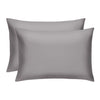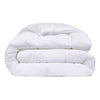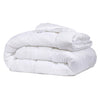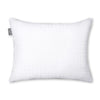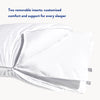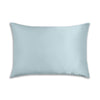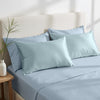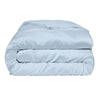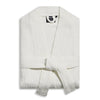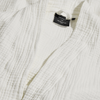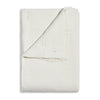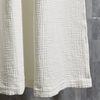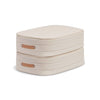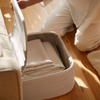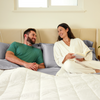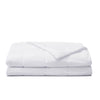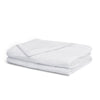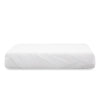The Daily Miracle
What Is Sateen: Egyptian Cotton vs. Sateen Cotton
Published
November 10, 2022
Author
Bridget Reed

When it comes to choosing the perfect betting for you, there are many things to consider. It’s not just about the look of your sheets, although that’s important too.
You have to consider your preferences in terms of how your sheets feel, what types of materials are best for you depending on how hot or cold you tend to run when you sleep, and what you’re willing to do to take care of your sheets.
For instance, some materials are machine washable and wrinkle-resistant — so if low maintenance is the name of the game for you, those priorities may trump things like higher thread counts. There’s also the price tag to consider. Some bed linen may appeal to you with its luster and luxurious feel… but if it’s out of your budget, you’ll want some alternatives.
So let’s break down two popular types of cotton used for bed sheets — Egyptian cotton and sateen cotton. We’re going to help you get a bit closer to finding the bedding that will have you looking forward to jumping into bed at the end of the day and waking up feeling rested.
What Is Egyptian Cotton?
Egyptian cotton is a pretty well-known and high-quality material, even if you aren’t aware of what specifically makes Egyptian cotton what it is. It originates from a specific type of cotton plant called the gossypium barbadense. Don’t worry — there won’t be a quiz at the end of this article.
This particular cotton plant gives Egyptian cotton some unique characteristics that can be really appealing. This type of cotton fabric tends to have a matte finish, which means they don’t have much of a sheen. Egyptian cotton may feel somewhat rough on your skin at first, but like linen, it’ll relax and become lived-in and ideally soft as you use and wash them.
Egyptian cotton is beloved not only for its feel and its ability to age like fine wine but also for its softness, durability, and the fact that they’re very breathable while you sleep. Because your body temperature significantly affects the quality of your sleep, this breathability is key. It can help your body regulate itself, leading to more restful sleep, especially for hot sleepers.
It’s what’s known as a long-staple cotton, which means it’s made of long fibers, which is part of what gives it all of these appealing qualities. The main drawback to Egyptian cotton is the price tag — they can cost you a pretty penny, which is why people often turn to cost-effective but similar alternatives like percale sheets.
What Is Sateen?
Sateen, the fabric, is made from cotton fibers (keep in mind that “sateen” can also reference a weave pattern).
In terms of fabric,the big thing that separates sateen from other types of cotton is how these cotton fibers are treated.
Cotton sateen fibers go through a process called mercerization, which means they’re soaked in something called lye and then rinsed with an acid. This helps to make the fibers extra durable, so they tend to stay in pristine shape much longer than traditional cotton.
Sateen fabric holds dye much more easily than other cotton materials. The mercerization makes it smoother and more reflective than other materials, which gives it the quality you’re probably familiar with: its lustrous sheen.
But you have to be careful when looking for sateen sheets. There’s a process called calendering which achieves similar results as mercerization aesthetically. Calendered sheets will have the same sheen and smoothness as proper sateen sheets, but they have none of the durability, so they are more likely to break down after a few washes.
Are There Other Types of Cotton Sheets?
Yes! There are many different types of cotton out there to choose from, as well as other materials like linen which are derived from the flax plant. But the type of cotton we’d like to focus on in this section is called Supima Cotton.
Supima cotton has many similar qualities to Egyptian cotton and sateen — in fact, it comes from the same type of plant as Egyptian cotton, although Supima is specific to America. It’s short for “superior” cotton, so you can probably guess where we’re going with this.
As compared to other types of cotton, Supima cotton has especially long fibers, which are naturally more durable and resilient when it comes to washing than other fibers. It’s basically a step up from Egyptian cotton in quality — and it’s super soft. There’s none of that break-in time where the sheets feel potentially too crisp before they’ve gone through the wash cycle a few times.
Supima cotton makes up a small percentage of worldwide cotton production, so you can expect the price tag on Supima cotton sheets to be significant… unless we’re talking about Miracle Made Anti-MicrobialSheets. Miracle Made’s sheets are made from Supima cotton and made in a sateen weave. So, if you were debating between Egyptian cotton and sateen sheets, Miracle Made sheets have the best of both worlds.
In addition to being made from a 500-thread count, ultra-luxurious, smooth, and silky Supima cotton, these sheets are infused with antibacterial silver, which means that they’re resistant to 99.9% of bacterial growth. If you find yourself constantly missing wash day, these sheets ensure you feel fresh even if they’ve been on your bed a bit longer than they should have.
Which Should You Choose?
Ultimately, the choice of which sheets are best for you is down to personal preference. For instance, you may love the idea of Egyptian cotton, but you don’t love the feel. Or you may love the idea of sateen, only to realize that the sheen it gives off doesn’t match the vibe of your bedroom.
And while the appearance and aesthetic of your sheets can be important, it’s more important to think about how your sheets will impact your life practically. Are they breathable? Are they easy to take care of? Do they make you want to leap into bed joyfully as soon as you get home?
If you answered no to any of those questions, then it’s probably time for a bedding makeover. Be sure to test out sheets first, or else go to a store in person to feel them so you know what you’re getting. All of our products entitle you to a risk-free 30-night trial, so you don’t have to get into bed with anything you aren’t in love with.
The Best Sheets for Year-Round Comfort
There are many types of cotton available to you, not to mention many other materials out there like percale, rayon, and linen — just to name a few. So if you’re trying to makeover your bedding, deciding which sheet sets are right for you can seem like a bit of a maze.
It’s an important choice because the average adult is supposed to sleep between seven and nine hours per night — which means you’re spending a lot more time between the sheets than you probably realize.
While the right answer will be different for different people and is ultimately down to personal preference, if you look for a high thread count cotton, you’re probably going to be pretty happy with the high-end, silky feel of your sheets. Whether you adore Supima cotton or any other choice, we wish you sweet dreams!
Sources:
Effects of Thermal Environment on Sleep and Circadian Rhythm | Journal of Physiological Anthropology
Antibacterial Silver | National Library of Medicine
How Much Sleep is Enough? | National heart, Lung, and Blood Institute


